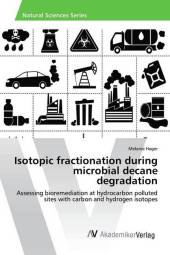 Neuerscheinungen 2016Stand: 2020-02-01 |
Schnellsuche
ISBN/Stichwort/Autor
|
Herderstraße 10
10625 Berlin
Tel.: 030 315 714 16
Fax 030 315 714 14
info@buchspektrum.de |

Melanie Hager
Isotopic fractionation during microbial decane degradation
Assessing bioremediation at hydrocarbon polluted sites with carbon and hydrogen isotopes
2016. 192 S. 220 mm
Verlag/Jahr: AV AKADEMIKERVERLAG 2016
ISBN: 3-330-50269-X (333050269X)
Neue ISBN: 978-3-330-50269-7 (9783330502697)
Preis und Lieferzeit: Bitte klicken
Groundwater from a diesel fuel-contaminated site in Vienna, Austria, was treated in pilot-scale subsurface flow constructed wetlands. The study aims at quantifying the contribution of biodegradation to the total removal of diesel compounds by means of compound-specific isotope analysis (CSIA). This innovative approach requires a constant isotope fractionation during the microbial transformation reaction which leads to an enrichment of the heavy isotopes, i. e. 13C and 2H, in the remaining pollutant. Filter material and/or groundwater was incubated in laboratory microcosms and the aerobic degradation of n-decane, which was chosen as model compound for diesel hydrocarbons, was monitored. Isotope fractionation was absent in water saturated microcosms because only minor n-decane biodegradation took place. During n-decane biodegradation in moist filter material, on the other hand, small but variable isotopic fractionation factors were found. The different experimental set-ups give indications how mass transfer limitations of hydrophobic molecules might mask isotopic fractionation and the consequences for field applications of CSIA are discussed in detail.
Hager, Melanie
Hager Melanie, born 1986/02/01. Education: Environmental engineering and water management, terminated 2016/04/27 at the University of Applied Life Sciences, Vienna.Master Thesis: ´Determination of the 13C/12C and 2H/1H isotopic fractionation factor during microbial degradation of decane: a microcosm study´


